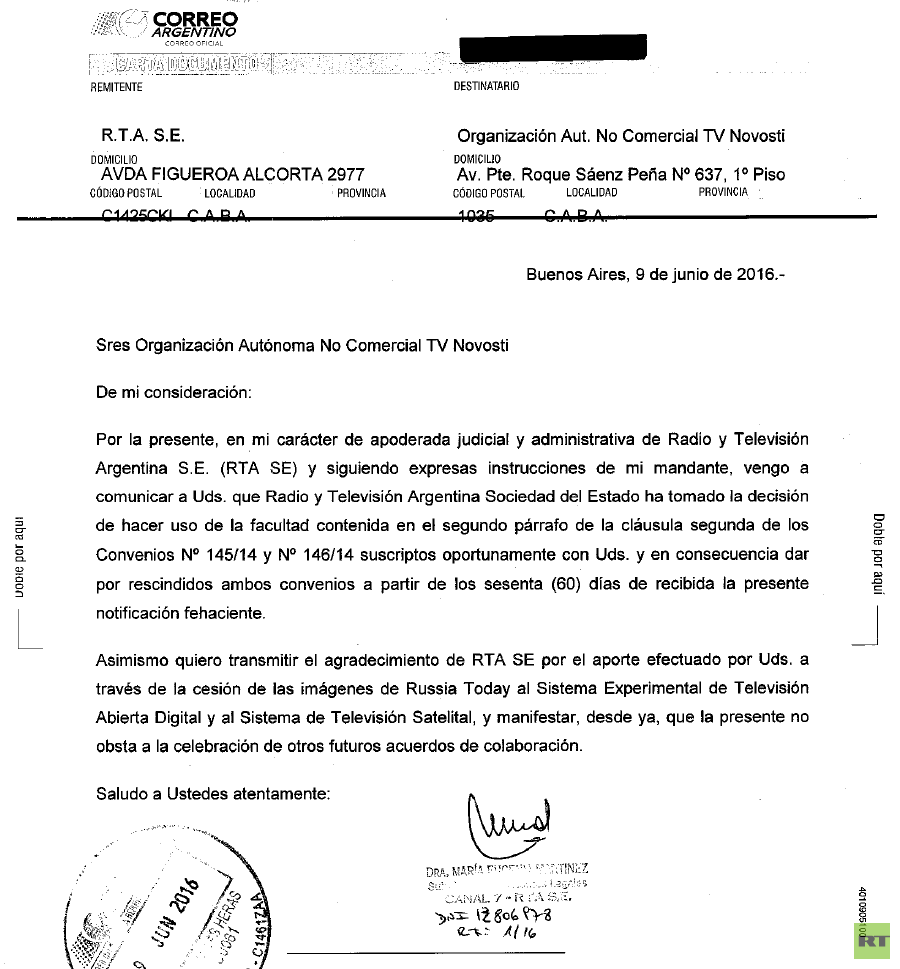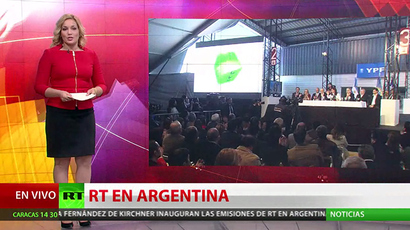Argentina to suspend RT from national broadcasting
The Argentinian state media authority has decided to suspend the nationwide broadcast of RT Spanish. In 2014, RT became the first foreign TV channel to be shown on national television in Argentina.
According to an official notification from the national RTA SE media body, the suspension will come into force in 60 days. The channel will be excluded from free transmission, but will still remain in paid TV packages.
The media governing body expressed its “gratitude” for a fruitful cooperation and the contribution of RT Spanish to the national satellite and digital broadcasts in a letter signed by RTA’s Maria Eugenia Martinez, who emphasized that current notification of suspension “does not prevent the conclusion of other future partnerships.”
On June 7, a similar letter was sent to the pan-Latin American terrestrial and satellite television network TeleSUR TV, notifying that its broadcasting in Argentina would be suspended within 15 days. TeleSUR President Patricia Villegas denounced the move as “censorship” on the part of the right-wing Argentine president Mauricio Macri and his government.
Both letters cited the “need to renew the program listings” of Argentina’s Experimental System of Digital Terrestrial Television and Satellite Television Systems as the reason for suspensions.
Censura @mauriciomacri a @teleSURtv#NoNosCallarán#TeleSURConArgentinapic.twitter.com/Mxb3l9UfE9
— Patricia Villegas (@pvillegas_tlSUR) June 8, 2016
“The official explanation has been that they need those channels presently occupied by the RT Spanish signal, and also the TeleSur Venezuela signal. The government is saying, officially, that they need those two frequency slots to transmit provincial channels, channels from Argentinian provinces, for example Tierra del Fuego which is way down in the South,” said international political analyst and RT contributor Adrian Salbuchi. “But that is hardly a credible explanation of any sort whatsoever.”
READ MORE: RT and Venezuela TeleSUR journalists unite to provide fresh perspective on news
“RT and also TeleSUR… definitely [have] a very alternative view on international politics, finance, economic treaties, for example like the Trans-Pacific Partnership, and so forth… regrettably, what we are seeing at least in Argentina is a case of censorship where the government does not want alternative viewpoint… to be heard by the Argentinian population,” Salbuchi added.
OP-EGDE: ‘RT broadcast halt in Argentina is all-out psychological onslaught on Latin America’
“I think that part of this is an effort to deny the citizens of Argentina the opportunity to hear a plurality of voices about what is taking place in other countries in the region,” believes RT Spanish “Behind the News” host and attorney Eva Golinger. “This is a government that has just completed six months in office. It’s a really narrow timeframe, and yet they’ve already taken harsh measures… TeleSUR may have had a more critical voice towards the government, but this is a government that ran on a platform saying they were promoting wider democracy and more freedoms in Argentina. And now we are seeing that what they are actually doing is the opposite.”
Konstantin Kosachev, chairman of the Russian Upper House committee for foreign affairs, said that the main reason for RT’s suspension “is the shift in the power in Argentina” after pro-American Mauricio Macri became president in late 2015.
According to the official, the move is one of the first signs of Argentina’s rapprochement with the US.
“The US always and everywhere are trying to consistently monopolize the information realm and remove all other alternative sources of information. We know how concerned the US authorities are by the popularity of RT,” Kosachev stressed.
The decision to launch RT’s Spanish-language channel as part of the Latin American country’s national television broadcast in 2014 was applauded by the presidents of Russia and Argentina.
“Harsh information wars and the attempts of some countries to monopolize the truth and use it in their own interests have become a sign of modern times,” President Vladimir Putin said at the time, stressing that “in these circumstances alternative sources of information are particularly in demand. RT is definitely one of them.”
Former Argentinian leader Cristina Fernandez de Kirchner also praised the initiative back in 2014 saying, “we are really glad to welcome RT Spanish in Television Digital Terrestre (TDA), which is available all over the country.”














